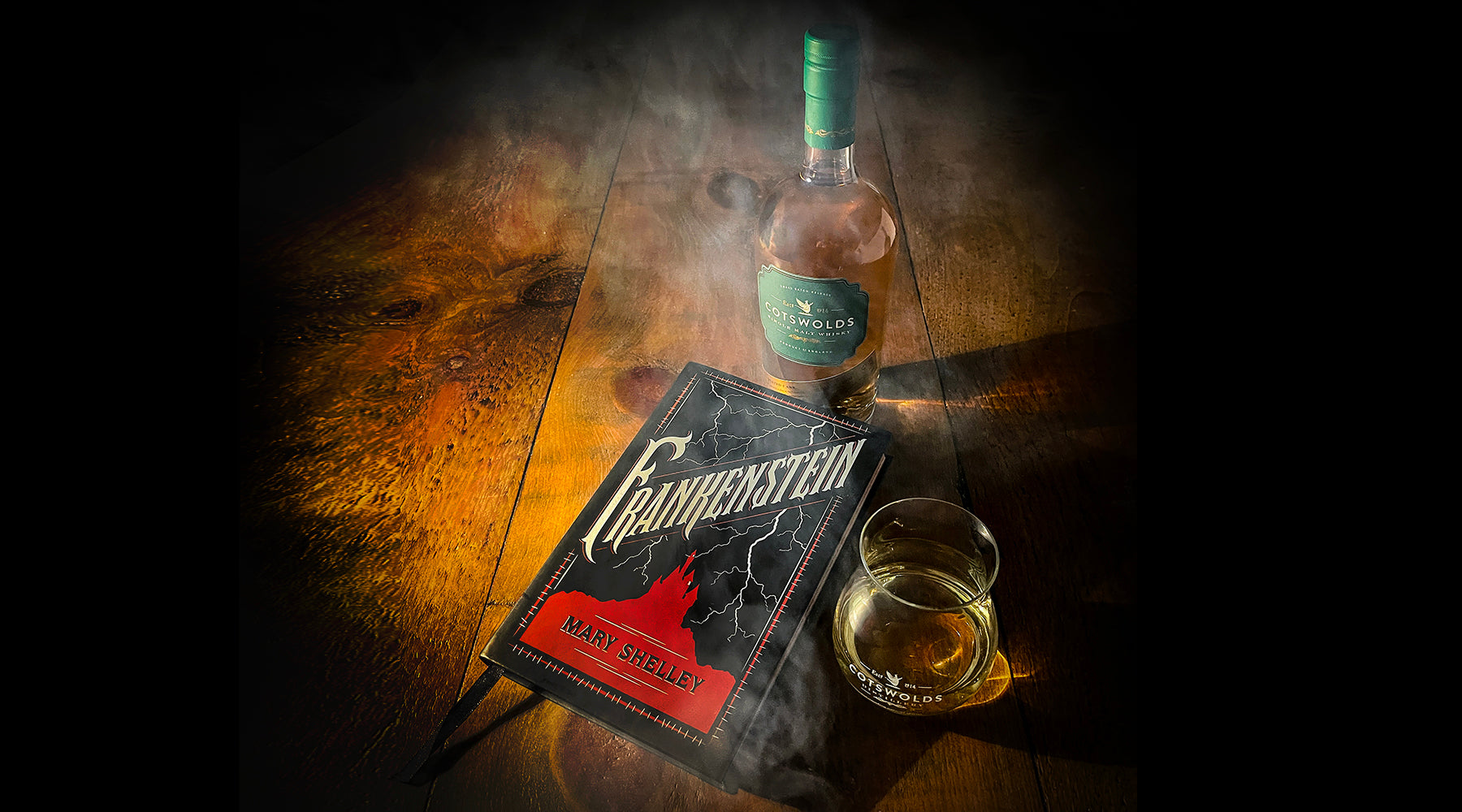
It is a truth universally acknowledged that the perfect companion to whisky is a good book. As the evenings begin to draw in, and we find ourselves reaching for a cosy blanket, there is no better way to spend a night than with a glass of golden whisky in one hand and the written word in the other. With spooky season upon us, it seems only natural that this month’s recommended read is a gothic classic: Mary Shelley’s, Frankenstein.
Despite its wintry setting and haunting narrative, Mary began to sew the seeds of the novel in the month of May 1816. Mary Godwin as she was then known, had travelled to Switzerland to visit the Villa Diodati, Lord Byron’s residence in Geneva, along with her step-sister Claire, and Percy Bysshe Shelley who she would later marry; Mary had eloped with Shelley some two years prior, despite Percy already being married at the time – how scandalous! 1816 became known as ‘the year without a summer’ after a volcanic eruption in Indonesia the previous year resulted in clouds of volcanic ash settling in the atmosphere, wreaking havoc with weather systems continents away. This apocalyptic setting provided the inspiration for some wonderful Gothic works in addition to Frankenstein, such as Byron’s poem, ‘Darkness’:
The waves were dead; the tides were in their grave,
The moon, their mistress, had expir'd before;
The winds were wither'd in the stagnant air,
And the clouds perish'd; Darkness had no need
Of aid from them—She was the Universe.
- ‘Darkness’, Lord Byron (1816)
One can only imagine Byron’s dreary reality of being stuck indoors in what should have been a glorious springtime with no Netflix to turn to. Byron passed the time with alcohol and poetry performances, until he came up with the idea of a writing competition. He challenged his literary companions to write a ghost story, thus, Frankenstein was born from the revolutionary mind of Mary – a patchwork of her experiences current and past, sewn together in the form of a horrifying yet vastly misunderstood monster. Most of the novel was completed upon Mary’s return to England, where she held lodgings in Bath. If you find yourself exploring the Cotswolds, why not visit Mary Shelley’s House of Frankenstein in Bath.
It may be a little on the nose (pardon the pun), but Frankenstein pairs perfectly with our Peated Cask Single Malt. It’s subtle peat-smoke flavour, conjures a synaesthetic experience of the ashen atmosphere in 1816 and when the frightful moments become a little too much, you can seek comfort in the complementing vanilla notes, and the fruitiness of our single malt spirit; our distillers describe it as 'smoky vanilla ice cream'.
If you have somehow managed to go through life avoiding somebody knowingly telling you, “people often mistakenly call the monster Frankenstein, but that was actually the name of his creator”, then I am sorry to say that you have avoided it no more. Nevertheless, it is widely argued that Victor Frankenstein is in fact the true monster. He creates a being made from miss-matched body parts, brings him to life by frying him with electricity, then abandons him immediately after his creation. The morning after bringing his monster to life, Victor wakes to find the monster standing over him, smiling. His reaction is far from that of a proud parent: ‘Mingled with this horror, I felt the bitterness of disappointment; dreams that had been my food and pleasant rest for so long a space were now become a hell to me; and the change was so rapid, the overthrow so complete!' Victor, we’ve all been there when we see our own reflection staring back at us in the mirror the morning after a particularly heavy night before - perhaps Victor is less horrified by the monster’s appearance, and more by the flaws in himself that the monster reflects.
It’s no secret that Frankenstein’s monster does not have a happy ending. Despite learning how to articulate his feelings, he is limited in how far he can explore the complex emotions he observes in mankind. He is an outsider by no fault of his own. When the monster confronts Victor, he declares, ‘Unfeeling, heartless creator! You had endowed me with perceptions and passions, and then cast me abroad an object for the scorn and horror of mankind!’ and so the tragedy continues. One can’t help but feel that if Victor Frankenstein had simply sat down with his creation and shared with him words of compassion, kindness, and love over a tot of whisky, then maybe – just maybe – the tragedy could have been avoided.
Buy here: Cotswolds Peated Cask Single Malt Whisky - £69.95
Nose: Vanilla with light charring and a touch of dried fruits and spice.
Palate: Creamy peat smoke layered with light fruits and tannin-rich wood.
Finish: Lasting finish of smoking embers, floral honey and woody sugars.

